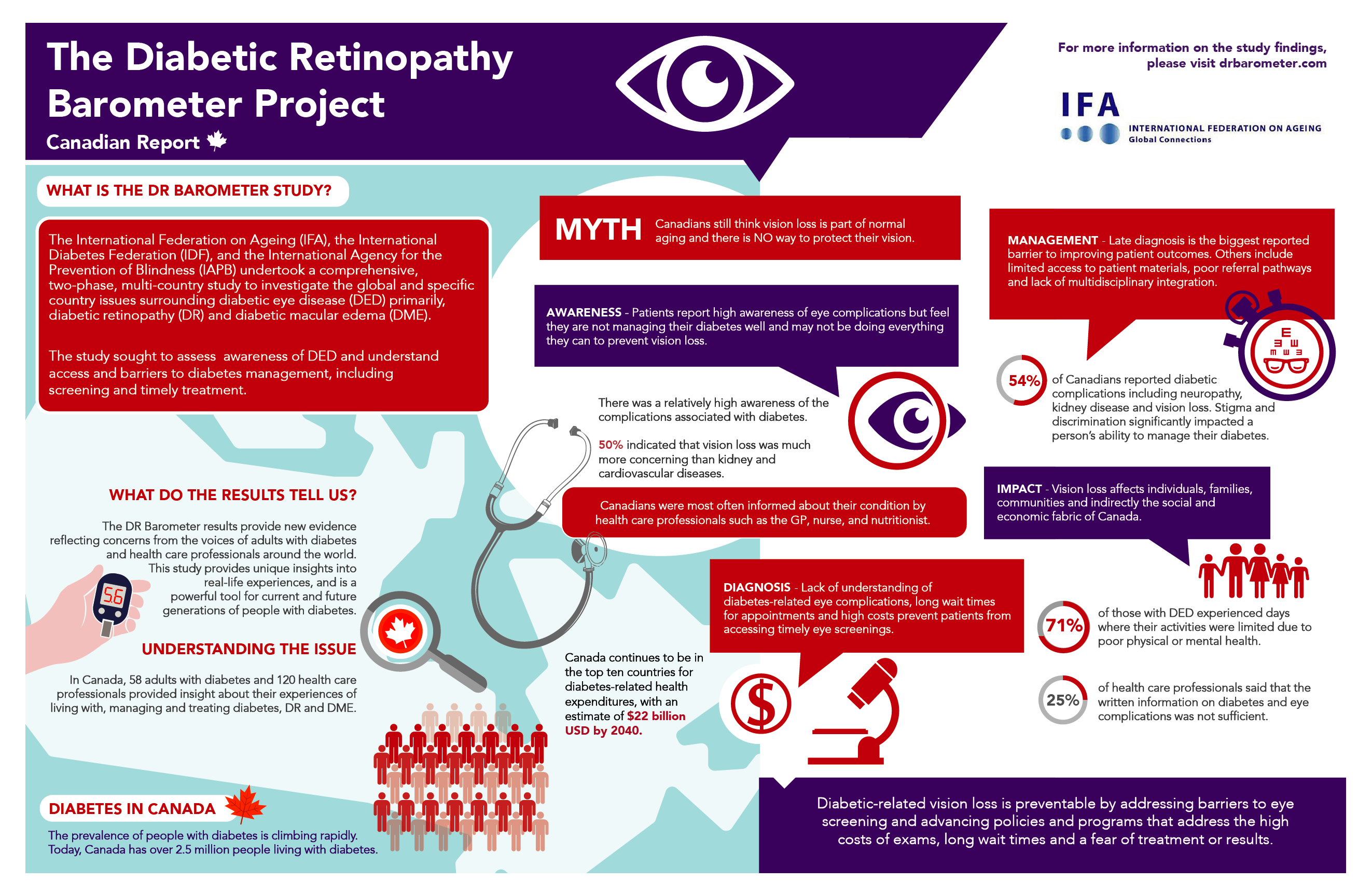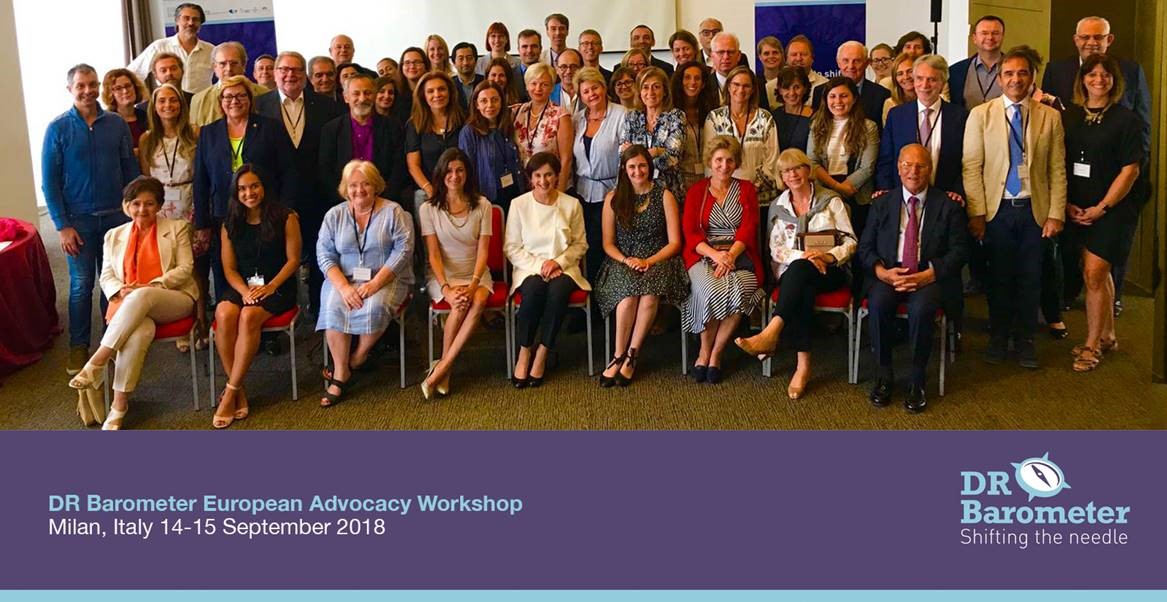DR Barometer Program Celebrates Canadian Vision Health Month

The Diabetic Retinopathy (DR) Barometer Program is an action network of individuals and organizations working to improve the vision health outcomes of adults with diabetes through collaboration, action and knowledge exchange. This program was first initiated with the ground-breaking 41 country DR Barometer Study.
With a rapidly ageing population, understanding the risks of acquiring an age-related vision health condition is of critical importance. Vision Health Month in May represents an opportunity to join the Canadian conversation regarding the impact of vision health by showcasing key findings from the DR Barometer Study as well as sharing new DR Barometer program developments. The awareness campaign also highlights the importance of education and patient empowerment, as well as equitable access to safe and effective screening and treatment of eye conditions for everyone, but specifically for older people and those most at-risk, or neglected by other mechanisms of health promotion.
Aligned with current global trends it is anticipated that by the year 2040 individuals 65 years or older will make up over a quarter of the Canadian population. The reality of population ageing poses significant challenges, one of which is the increased prevalence of non-communicable disease, specifically diabetes.
Canada has over 2.5 million people living with diabetes, a number of which is only expected to grow in the coming years. The DR Barometer study helped to shed light on the impact of vision related health outcomes for individuals living with diabetes as well as the barriers and factors which contribute to the screening, treatment and management of diabetes related vision complications. While Canadian patients reported relatively high awareness of eye complications there is still a pervasive belief that vision loss is inevitable and that there is no way to prevent it. This is exacerbated by the fact that late diagnosis was noted as one of the most significant barriers to improved vision health outcomes.
The Growing DR Community
Capitalizing on the momentum of the DR Barometer Study two regional workshops were convened in 2018 bringing together diverse stakeholders and representing 18 countries. These attendees included advocates for diabetes, vision health, and older persons, ophthalmologists, diabetes specialists, geriatricians, primary care providers, public health professionals, and industry. The program featured plenary sessions with key opinion leaders focused on regional specific topics including the burden of disease, patient education and empowerment, screening practices, latest treatment options, and the need for a coordinated approach to diabetes care. Interactive breakout sessions facilitated cross-disciplinary dialogue, collaboration, and development of potential strategies to improve patient outcomes.

The DR Barometer Communities of Practice
The findings of the Dr Barometer Study and the outcomes of the two regional workshops ultimately coalesced in the establishment of the three distinct Communities of Practice (CoP). The DR Barometer Program’s three CoPs: Patient Education and Empowerment, Coordinated Care and Guidelines and Protocols, encapsulate the priority areas identified and provide an evidence-based foundation with which to drive meaningful change in the screening, treatment, and prognosis of diabetic retinopathy for adults living with diabetes.
The Patient Education and Empowerment CoP looks to address the lack of knowledge and awareness regarding diabetes relate vision health which were key predictive factors in adherence to vision health care recommendations.
“Education is at the heart of a proactive approach to manage the threat of preventable blindness. The data is quite clear and showed us that the current information is not adequate for patients and in reality, only half of the ophthalmologists in the study had written detection protocols for staff and in some instances, educational material didn’t even exist,” says Dr. Jane Barratt
The Coordinated Care CoP attempts to address the barriers in the coordination and communication of health care services. These gaps and / or disconnections in the patient care pathway can lead to delays in diagnosis, increased likelihood of impaired vision and a decrease in the overall management of the disease.
“All individuals with type 2 diabetes should be screened at the time of diagnosis and regularly thereafter. Helping prevent diabetes related vision loss requires close collaboration between patients and their health-care provider, as well as ensuring all people with diabetes have access to evidence-based screening and treatment,” says Dr. Jan Hux.
Lastly the Guidelines and Protocols CoP addresses the growing need for consistency across healthcare systems as well as an increase in the awareness and uptake of guidelines and protocols by health care professionals. The IFA as secretariat of the DR Barometer Program is excited to announce the upcoming launch of the new DR Barometer website which will feature interactive forums in which individuals can engage with the DR Barometer Community. Join the DR Community and help shift the needle and make real change happen in our health systems and communities, ultimately creating a world where people do not experience vision loss due to diabetes.


